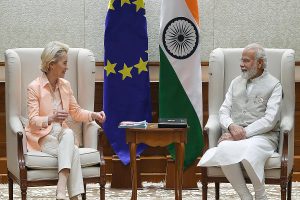National Conference (NC) Chief Farooq Abdullah on Thursday said that the Centre before bringing the Uniform Civil Code should consider that the country is diverse.
Farooq Abdullah also extended his greetings on the occasion of Eid al-Adha. He got emotional while explaining the significance of the day, which recognises Prophet Ibrahim’s willingness to sacrifice everything, including his son Ismail for Allah. Meanwhile, the former chief minister of Jammu and Kashmir extended his wishes to the pilgrims embarking on the Amarnath Yatra, commencing on July 1.
Advertisement
“They (Central Government) should consider that the country is diverse. People of all religions, languages, and ideologies live here, and as for Muslims, they have their Shariat laws too. The Government should think about any possible storm that would come if they take a step in this direction (implement UCC)” he said.
“I send my best wishes to the (Amarnath) Yatra. It is starting tomorrow, may Allah bless them with success in taking blessings from here,” he said.
“I wish everyone on the occasion of Eid ul-Adha and pray to Allah to accept our sacrifices, forgive our sins, and free Jammu and Kashmir from the difficult times it is facing now,” said the PDP chief.
“Today is the day when we make sacrifices in the name of Allah. We hope Allah accepts our offerings and relieves us of some of our problems, thus allowing us to live peacefully,” he added.
Meanwhile, Jammu and Kashmir Peoples Democratic Party (PDP) Chief, Mehbooba Mufti, also extended her greetings to everyone on the occasion of Eid al-Adha.
Eid Al-Adha or Bakra Eid, which is being observed on June 29 this year, is a holy occasion also called the ‘festival of sacrifice’ and is celebrated on the 10th day of Dhu al-Hijjah, the 12th month of the Islamic or lunar calendar. It marks the end of the annual Hajj pilgrimage.
Every year, the date changes as it’s based on the Islamic lunar calendar, which is about 11 days shorter than the Western 365-day Gregorian calendar.
The festival is an occasion of joy and peace, where people celebrate with their families, let go of past grudges and make meaningful connections with one another. It is celebrated as a commemoration of Prophet Ibrahim’s willingness to sacrifice everything for God.
Eid traditions and festivities vary around the world, and different countries have unique cultural approaches to this important festival.











